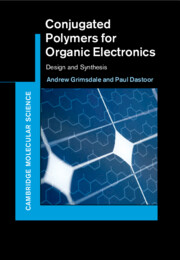Book contents
- Conjugated Polymers for Organic Electronics
- Cambridge Molecular Science
- Conjugated Polymers for Organic Electronics
- Copyright page
- Contents
- Preface
- Abbreviations
- 1 Introduction
- 2 Polyacetylenes
- 3 Poly(arylene vinylene)s
- 4 Poly(arylene ethynylene)s
- 5 Poly(phenylene)s
- 6 Polyfluorenes and Related Polymers
- 7 Polythiophenes
- 8 Other Arylene-Based Polymers
- 9 Hyperbranched Polymers, Star Polymers and Dendrimers
- 10 Polymers with Molecular-like Chromophores
- 11 Polymers for Phosphorescent LEDs
- 12 Polymers for White-Emitting PLEDs
- 13 Polymers for Other Luminescent Devices
- 14 Conclusion and Outlook
- References
- Index
7 - Polythiophenes
Published online by Cambridge University Press: 28 March 2024
- Conjugated Polymers for Organic Electronics
- Cambridge Molecular Science
- Conjugated Polymers for Organic Electronics
- Copyright page
- Contents
- Preface
- Abbreviations
- 1 Introduction
- 2 Polyacetylenes
- 3 Poly(arylene vinylene)s
- 4 Poly(arylene ethynylene)s
- 5 Poly(phenylene)s
- 6 Polyfluorenes and Related Polymers
- 7 Polythiophenes
- 8 Other Arylene-Based Polymers
- 9 Hyperbranched Polymers, Star Polymers and Dendrimers
- 10 Polymers with Molecular-like Chromophores
- 11 Polymers for Phosphorescent LEDs
- 12 Polymers for White-Emitting PLEDs
- 13 Polymers for Other Luminescent Devices
- 14 Conclusion and Outlook
- References
- Index
Summary
Polythiophenes are the most widely studied class of heteroarene-based polymers. The properties of poly(3-alkylthiophene)s have been shown to depend upon the degree of regioregularity in the polymer backbone. Routes have been developed to make almost completely regioregular polymers with nearly 100% head-to-tail couplings. These regioregular polymers show much better chain packing in the solid state and significantly better charge carrier mobilities, making them suitable for use in OTFTs. They show less promise as LED materials due to low emission efficiencies, but are promising as solar cell materials. A combination of regioregular poly(3-hexylthipophene) and a fullerene acceptor is the most widely studied donor–acceptor pair in OPVs, with device efficiencies of over 5% combined with a relatively inexpensive synthesis, making it potentially commercially viable.
Information
- Type
- Chapter
- Information
- Conjugated Polymers for Organic ElectronicsDesign and Synthesis, pp. 104 - 116Publisher: Cambridge University PressPrint publication year: 2024
